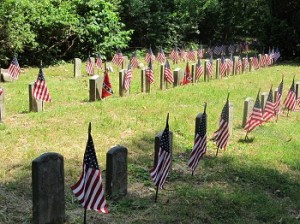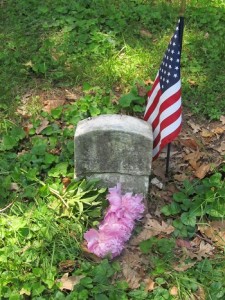(This essay is one in a series of pieces about what I am reading during National Short Story Month 2011. To see a list of the stories, visit What I’m Reading During National Short Story Month 2011.)
May 30, 2011
Monday
The day had a certain unearthly beauty — most of our Memorial Days do have. Sometimes they scorch a little, and the processions wilt and lag. . . . [The townspeople] were graver than they usually were on the national anniversary which had come to mean remembrance for the old and indifference for the young.
                — Elizabeth Stuart Phelps Ward, 1844-1911
                    American feminist, antivivisectionist, social critic, and fiction writer
                    from “Comrades,” written in 1910 and published posthumously
Today is Memorial Day, as observed in the United States. Depending on your point of view, your cultural background, or your level of cynicism, it is a day set aside to honor and remember those who have died while in military service during a war, to remember all who served in the military during a war and who have since died, to honor all those who have ever served in the military as well as those who serve now, to honor and remember anyone who has died, or to have a three-day weekend that marks the unofficial start of summer, a weekend to have cookouts, open the pool, and buy stuff on sale.
I’ve written about Memorial Day before, most recently in May of 2009. I talked about my father’s military service (he was a noncombatant teacher of English to Puerto Rican recruits) and my neglect of what I saw as a daughter’s duty to see that his grave is marked as that of a veteran. Last year I finally acquired and placed a bronze marker with a flag. The flag by now is probably tattered and worn from the wind and the weather that passes over the hill where St. Canicus Cemetery sits. I hope that the volunteers who walk the cemeteries just before Decoration Day looking for service markers that need flags have placed a new one. My sister and I will see for ourselves when we make our annual pilgrimage there in June.
This morning I looked for a story to read that would tie in with Memorial Day and veterans and remembering. Observances of the sesquicentennial of the Civil War have begun. I live not far from Gettysburg, and the neighborhood I grew up in was an important camp of that era. My stalled historical novel is not a Civil War novel, even though one of the central characters is wounded at the Battle of Gettysburg. In a book of ten stories, I acquired as part of my research, Civil War Women, I found the perfect item.
Elizabeth Stuart Phelps Ward is known to me as the author of The Gates Ajar and two other novels that are part of the genre of consolation literature that was popular in the nineteenth century. They examine what happens to us after we die and the idea of being able to communicate with the dead. Her story “Comrades” concerns Reuben Oak, an elderly Civil War veteran and one of only four of the remaining comrades-in-arms who founded the Charles Darlington Post of the Grand Army of the Republic. His health is declining, and on the Memorial Day of the story, he is concerned that he might be unable to march in the town’s traditional parade and to “decorate Tommy,” the cenotaph that honors his son, who died aboard the USS Maine. He is supported by his wife, Patience, whose love and care and self-sacrifice help him face this and other end-of-life issues.
The epigraph I took, written a hundred years ago, almost exactly captures the spirit of this day. It’s an H³ day — hazy, hot, and humid — and what parades there might be will certainly see their participants wilt and lag. The newspaper is filled, as usual every year, with laments that the day has lost its meaning, that it is nothing more than the last day of another three-day holiday, even though this year it happens to fall on its “traditional” date of May 30, which was a Saturday in 1868, when General John Logan, the commander of the Grand Army of the Republic, proclaimed it.
 I decided to make a small pilgrimage this morning to Soldiers’ Lot n the historic Harrisburg Cemetery, chartered in 1845 and a good example of the nineteenth century garden cemetery that I study. This area, which began filling in 1862 with the remains of Civil War soldiers who died in military hospitals in Harrisburg, also contains the remains of Confederate soldiers wounded at Gettysburg and brought to Harrisburg as prisoners of war, where they died. The graves of all the fallen were originally unmarked. Headstones were erected later. All of the graves are marked on Decoration Day with flags, including Confederate flags for those buried far from their homes. Even though the cemetery is shaded by large trees, I wilted and lagged as a I walked among the graves, and cut my visit short without visiting the resting place of William McCormick, 1867-1923, a Harrisburg-born newspaperman whose work I study.
I decided to make a small pilgrimage this morning to Soldiers’ Lot n the historic Harrisburg Cemetery, chartered in 1845 and a good example of the nineteenth century garden cemetery that I study. This area, which began filling in 1862 with the remains of Civil War soldiers who died in military hospitals in Harrisburg, also contains the remains of Confederate soldiers wounded at Gettysburg and brought to Harrisburg as prisoners of war, where they died. The graves of all the fallen were originally unmarked. Headstones were erected later. All of the graves are marked on Decoration Day with flags, including Confederate flags for those buried far from their homes. Even though the cemetery is shaded by large trees, I wilted and lagged as a I walked among the graves, and cut my visit short without visiting the resting place of William McCormick, 1867-1923, a Harrisburg-born newspaperman whose work I study.
I left purple peonies at the grave of one veteran whose marker lies across the road from the rest of those in Solders’ Lot and whose information is unreadable. Perhaps, like Reuben Oak, he survived into his old age and came each year to honor his comrades and others. Peonies were the favorite flower of the grandfather, b. 1864, I never knew, and purple is the color of my fiction. It’s a day like this that sends me back into the nineteenth century, and into thinking about that manuscript again.
